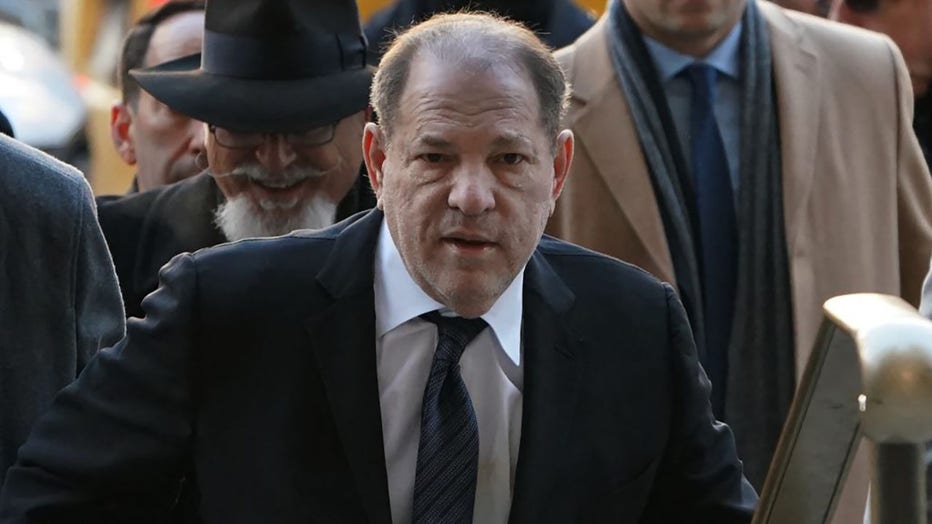Harvey Weinstein's conviction overturned: What to know
Harvey Weinstein's 2020 rape conviction overturned
New York’s highest court on Thursday overturned Harvey Weinstein’s 2020 rape conviction, finding the judge at the landmark #MeToo trial prejudiced the ex-movie mogul with "egregious" improper rulings, including a decision to let women testify about allegations that weren’t part of the case.
NEW YORK - Harvey Weinstein’s 2020 rape conviction in the landmark #MeToo trial was overturned on Thursday by New York’s highest court, reopening a painful chapter in America’s reckoning with sexual misconduct by powerful figures.
The state Court of Appeals found that the judge prejudiced the ex-movie mogul with "egregious" improper rulings, including a decision to let women testify about allegations that weren’t part of the case.
The court ordered a new trial, and his accusers could again be forced to take the witness stand again.
Here’s what to know about Weinstein, the case, and the new ruling:
What was Harvey Weinstein convicted of?

FILE - Harvey Weinstein arrives at the Manhattan Criminal Court, on Jan. 22, 2020, for opening arguments in his rape and sexual assault trial in New York City. (Photo by TIMOTHY A. CLARY/AFP via Getty Images)
Weinstein, now 72, has been serving a 23-year sentence in a New York prison following his February 2020 conviction.
He was found guilty of raping an aspiring actress in a New York City hotel room in 2013 and sexually assaulting production assistant Mimi Haleyi at his apartment in 2006 by forcibly performing oral sex on her.
He was acquitted on the most serious charges, two counts of predatory sexual assault, each carrying a sentence of up to life in prison. Both of those counts hinged on the testimony of "Sopranos" actress Annabella Sciorra, who said Weinstein barged into her apartment, raped her and forcibly performed oral sex on her in the mid-1990s.
Why was the conviction of Harvey Weinstein overturned?
Weinstein’s conviction stood for more than four years, heralded by activists and advocates as a milestone achievement, but dissected just as quickly by his lawyers and, later, the Court of Appeals when it heard arguments on the matter in February.
"We conclude that the trial court erroneously admitted testimony of uncharged, alleged prior sexual acts against persons other than the complainants of the underlying crimes," the court's 4-3 decision on Thursday said. "The remedy for these egregious errors is a new trial."
The court's majority said "it is an abuse of judicial discretion to permit untested allegations of nothing more than bad behavior that destroys a defendant’s character but sheds no light on their credibility as related to the criminal charges lodged against them."
In a stinging dissent, Judge Madeline Singas wrote that the majority was "whitewashing the facts to conform to a he-said/she-said narrative," and said the Court of Appeals was continuing a "disturbing trend of overturning juries’ guilty verdicts in cases involving sexual violence."
"The majority’s determination perpetuates outdated notions of sexual violence and allows predators to escape accountability," Singas wrote.
Weinstein lawyer Arthur Aidala said immediately after the ruling came out: "We all worked very hard and this is a tremendous victory for every criminal defendant in the state of New York."
Will Harvey Weinstein be released from prison?
Weinstein will not be released and will remain imprisoned because he was convicted in Los Angeles in 2022 of another rape and sentenced to 16 years in prison.
What was the #MeToo movement?
Allegations against Weinstein, the once powerful and feared studio boss behind such Oscar winners as "Pulp Fiction" and "Shakespeare in Love," ushered in the #MeToo movement.
It was first founded by activist Tarana Burke, who coined the term "MeToo" in 2006, but the saying gained widespread attention as a hashtag in 2017 when actress Alyssa Milano urged victims of sexual assault to publicly share it online.
Millions began using #MeToo on social media, resulting in many powerful men in Hollywood or elsewhere facing accusations of assault in the workplace.
Specifically, dozens of women came forward to accuse Weinstein, including famous actresses such as Ashley Judd and Uma Thurman. His New York trial drew intense publicity, with protesters chanting "rapist" outside the courthouse.
The reversal of Weinstein’s conviction is the second major #MeToo setback in the last two years, after the U.S. Supreme Court refused to hear an appeal of a Pennsylvania court decision to throw out Bill Cosby’s sexual assault conviction.
The Associated Press contributed to this report. It was reported from Cincinnati.

